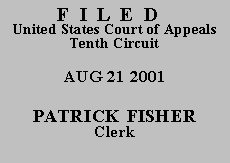

| FREDRICK PORTER, | |
| Plaintiff-Appellant, | |
| v. | |
| WAVETECH GEOPHYSICAL, INC.; RODNEY DANIELSON; JACK HOLTON; HELEN E. STARLING; JOHN DOE 1-99; and JANE DOE 1-99, | |
| Defendants-Appellees. |
State prisoner Fredrick Porter, proceeding pro se, appeals the district court's sua sponte dismissal of his in forma pauperis complaint as legally frivolous pursuant to 28 U.S.C. § 1915(e)(2)(B)(i). Appellant filed a 42 U.S.C. § 1983 claim against Wavetech Geophysical, Inc., and its employees, four of whom participated in a citizen's arrest of Appellant at Wavetech's offices. Appellant contended that he was denied due process when Wavetech's employees arrested him because they did not witness his commission of crime or have probable cause to believe he had done so. The district court dismissed Appellant's § 1983 claim because Appellant alleged that Wavetech's employees were not acting under color of state law. To state a claim under § 1983, a plaintiff must allege that defendant(s) acted under color of state law when depriving the plaintiff of a protected civil right.
A § 1915(e)(2)(B)(i) dismissal is reviewed for abuse of discretion. See Schlicher v. Thomas, 111 F.3d 777, 779 (10th Cir. 1997). An in forma pauperis complaint may not be dismissed merely because a court finds the "allegations unlikely." Denton v. Hernandez, 504 U.S. 25, 33 (1992). In reviewing a dismissal for frivolousness, this court considers, inter alia, whether the plaintiff was proceeding pro se, whether the district court inappropriately resolved genuine issues of material fact, whether the district court applied erroneous legal conclusions, whether the district court sufficiently explained its dismissal, and whether the dismissal was with prejudice when "frivolous factual allegations could be remedied through more specific pleading." Id. at 34.
In this case, we note that Appellant is proceeding pro se, a fact that the district court carefully considered. In addition, we observe that the court did not resolve any genuine issues of material fact, and its legal conclusions were well-known and correctly stated. Appellant alleged that neither Wavetech nor its employees acted under color of state law; however, an allegation that defendants acted under color of state law was required under § 1983. Finally, the district court's § 1915(e)(2)(B)(i) dismissal could not have been remedied by a dismissal without prejudice, followed by a more specific pleading by Appellant. After carefully considering the district court's opinion, we hold that the court did not abuse its discretion in dismissing Appellant's § 1983 action under 28 U.S.C. § 1915(e)(2)(B)(i).
Appellant has moved to proceed in forma pauperis on appeal pursuant to 28 U.S.C. § 1915. The district court denied this motion, finding that the appeal was not taken in good faith because Appellant had not shown the existence of a reasoned, nonfrivolous argument on the law and facts in support of the issues raised on appeal. We agree with the reasoning of the district court, and similarly deny Appellant's motion to proceed in forma pauperis.
For the reasons stated above, Appellant's motion to proceed in forma pauperis is DENIED and the judgment of the district court is AFFIRMED.
Entered for the Court
Monroe G. McKay
Circuit Judge
*. This order and judgment is not binding precedent, except under the doctrines of law of the case, res judicata, and collateral estoppel. The court generally disfavors the citation of orders and judgments; nevertheless, an order and judgment may be cited under the terms and conditions of 10th Cir. R. 36.3.